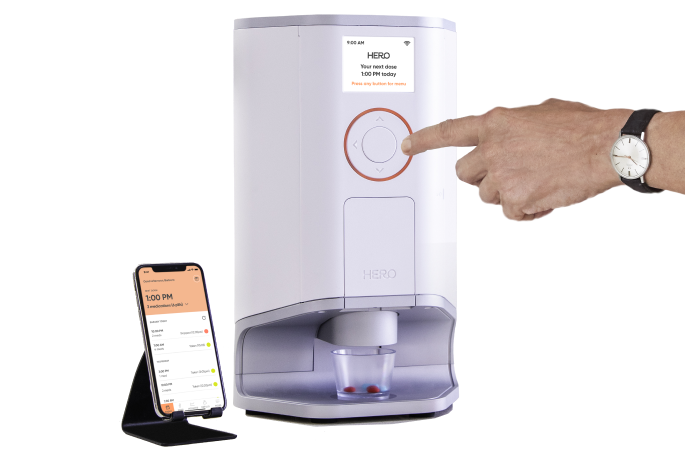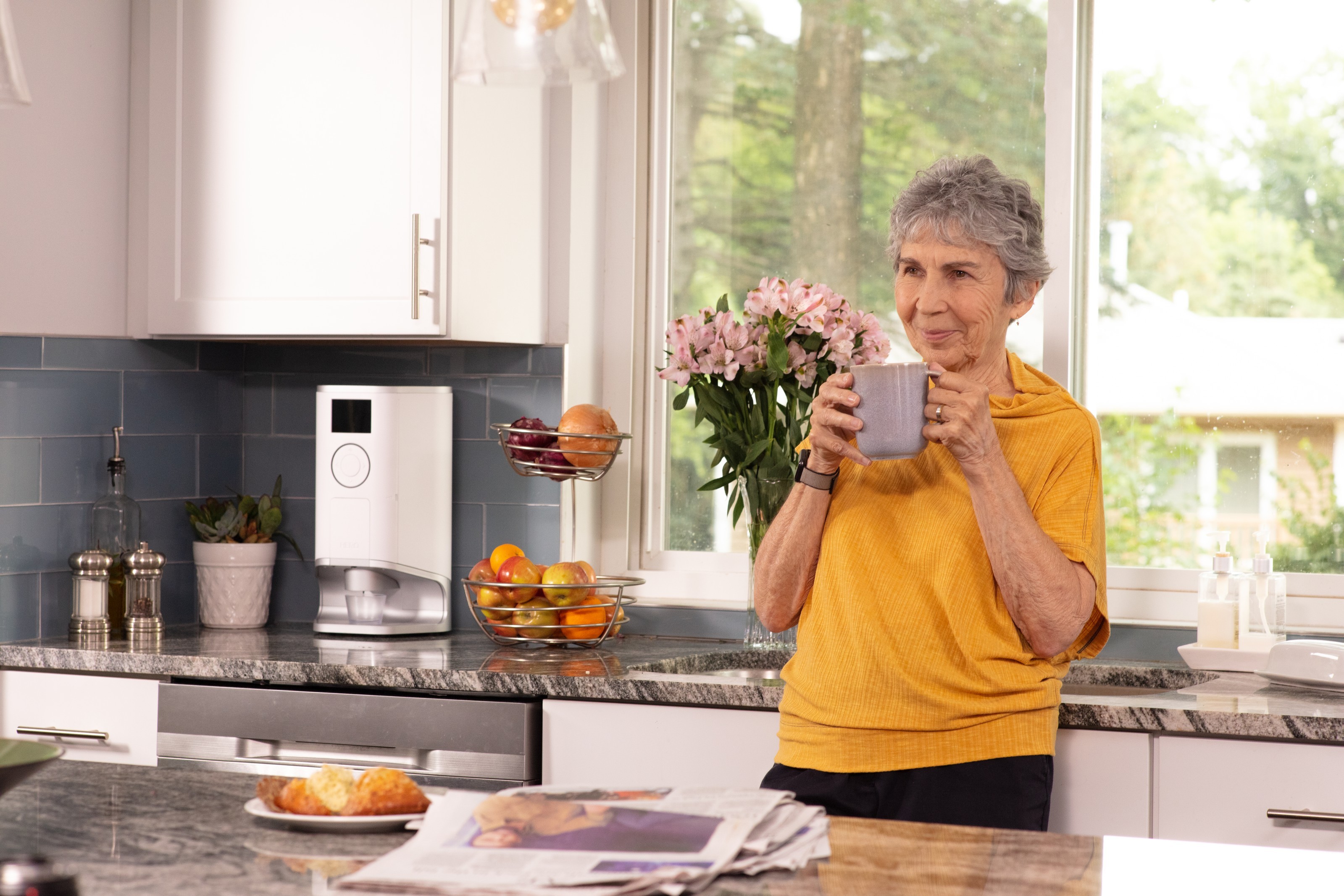The Invisible Workload: Recognizing the Mental Labor of Medication Management

The pill sorting and pharmacy runs are just the beginning. For a family caregiver, the real work is often the quiet, relentless mental labor, a silent, unpaid second shift that never seems to end. It’s the constant hum of worry and the endless checklist running in your head.
This invisible workload is the caregiver's mental load, and its weight is real. We see the burden you carry. Let's explore its hidden costs and, most importantly, find ways to lighten it.
What is the Caregiver's Mental Load?
It's the invisible checklist you carry in your mind, a constant background process that's always running.
It’s More Than Just a To-Do List
Managing medications for a loved one is not a simple checklist, it is a high-stakes project you never clock out from. A typical to-do list offers a sense of completion, but this mental checklist is different. It consumes your cognitive energy, often in ways you don't even notice until you're left feeling completely drained.
You're the Project Manager, Pharmacist, and Advocate
You’ve become the central communication hub for your loved one's health, and the work is immense. That invisible checklist in your head likely includes:
- Translating confusing pharmacy labels into a simple, daily routine.
- Timing every dose around meals, sleep, and other medications for safety and effectiveness.
- Coordinating all refills to prevent gaps in care, from 90-day supplies to insurance pre-authorizations.
- Watching for drug interactions, especially when a new over-the-counter medicine or supplement is added.
- Catching potential side effects and deciding whether to wait, call the doctor, or seek emergency help.
- Navigating the complexities of polypharmacy—managing five or more daily medications, which is common in older adults1 and significantly increases the risk of problems2.
The Weight of Being the "Safety Net"
Perhaps the heaviest part of this role is the medication management stress. You are the final line of defense against a potentially harmful mistake. This creates a pervasive fear of error that becomes a constant companion.
Did they take their morning pills?
Did I remember to call in that refill?
What if I give the wrong dose?
For so many caregivers, this anxiety is always there.
The Physical Toll of Mental Labor: When Stress Becomes Biological
That feeling of being perpetually drained isn't just in your head. The chronic stress from this mental labor has a real, measurable impact on your physical and emotional health.3
Your Brain on Constant Vigilance
Emerging research shows that chronic stress doesn't just exhaust you; it can physically reshape your brain. Prolonged stress can lead to structural changes in the prefrontal cortex, the area responsible for planning and focus, while increasing activity in the brain's fear center.4 It’s no wonder you might feel scatterbrained, forgetful, or more anxious than usual; your brain is adapting to a state of constant alert.
What All That Worry Is Doing to Your Body
This unrelenting mental vigilance triggers the release of stress hormones like cortisol.5 While useful in short bursts, a steady flood of cortisol can wreak havoc on your body. It can disrupt your sleep, weaken your immune system, impair your memory, and increase your risk for a host of health problems.6 Cognitive labor sticks, and so does the stress it produces.
The Emotional Cost: Isolation, Guilt, and Caregiver Burnout
Long before the physical symptoms appear, the emotional toll of the caregiver's mental load begins to mount. This is the quiet cost that can be the most damaging.
The Loneliness of an Invisible Job
One of the hardest parts of caring for a loved one is the feeling that no one truly understands the weight you carry. You might feel that your own identity has been submerged into your role, that your world has shrunk to revolve entirely around your loved one's needs. This can be incredibly isolating, even when you’re surrounded by people.
Navigating the Cycle of Guilt
Guilt is a near-universal experience for caregivers. You might feel guilty for feeling resentful or frustrated. You might feel guilty for taking a much-needed break for yourself. This cycle of guilt often pushes caregivers to take on more than they can handle, believing they are the only one who can do it right.
When the Load Becomes Too Heavy
When the stress becomes chronic and the support feels nonexistent, the inevitable result is caregiver burnout.7 Burnout isn’t just feeling tired; it’s a state of complete emotional, physical, and mental exhaustion. It's a sign that the invisible workload has become unsustainable.
How to Lighten the Mental Load: Finding Calm in the Chaos
Recognizing the load is the first step. Actively working to lighten it is the next. While you can't eliminate your responsibilities, you can take clear, actionable steps to reduce the mental energy they consume. Here are several ways to start.
1. Make Your Well-being a Priority, Too
You must care for yourself with the same dedication you give your loved one. Your well-being isn’t a luxury; it’s non-negotiable health maintenance. The National Institute on Aging stresses that protecting your own health is one of the most important things you can do as a caregiver.8
- Schedule Breathing Space: Actively schedule breaks into your calendar just as you would a doctor's appointment. This is your time to recharge.
- Guard Your Sleep: Prioritize getting enough sleep. Chronic stress is profoundly draining, and sleep is one of your body’s primary tools for recovery.
- Nutrition matters: Do your best to eat regularly and choose healthy options.
- Prioritize Movement: Make time for physical activity most days. Even a short walk can help reduce stress, improve your mood, and increase energy.
- Isolation and loneliness prevention: Join a caregivers support group and spend some time with friends.
If you’re hitting a wall, feeling constant irritability, exhaustion, or brain fog, it's a sign your own health needs attention. Talk to your clinician about the stress you are under.
2. Externalize Your Brain
Stop trying to hold every detail in your mind. Use tools like a one-page medication list, shared digital calendars for appointments, or a dedicated notebook for questions. Getting the data out of your head and into a reliable external system frees up precious cognitive space.1
3. Share the Responsibility
You don't have to do this alone. If you can, have a direct conversation with siblings or other family members. Don’t just say you’re "stressed"; give them specific, concrete tasks they can own, like being in charge of all pharmacy communication or handling insurance paperwork.
4. Simplify the Regimen
Don't be afraid to streamline the medication routine where possible. Ask the clinician about once-daily alternatives or if it might be safe to "deprescribe" (stop) any medications that are no longer providing a benefit, a key strategy for reducing risk in older adults.9
5. Automate and Simplify with Pharmacy and Smart Tools
- Many pharmacies offer services that can reduce your logistical workload. Ask about medication synchronization ("med sync") to line up all monthly refills on a single day.10
- You can also ask about multi-dose blister packaging. For many, weekly pill organizers and calendared blister packs are proven to reduce those "Did we take it?" moments.
- Weekly pill organizers and calendared blister packs reduce “Did we take it?” moments and improve adherence in many studies. Ask your pharmacy about multi-dose blister packaging.
- For complex regimens or memory challenges, automatic pill dispensers can cue doses, keep medication contained and alert caregivers if a dose is missed.11
6. Connect with a Professional Care Team Remotely
A growing area of healthcare called Remote Therapeutic Monitoring (RTM) is creating new ways for your loved one’s clinical team to support you from a distance. RTM programs allow professional healthcare providers to monitor medication adherence and response to therapy between visits, giving them a clearer picture of what’s happening at home. For a caregiver, this means having an extra layer of professional oversight, which can provide incredible peace of mind.
This is an exciting and growing area of healthcare, and we'll be sharing more about RTM in future blog posts.
Hero: Automate the Repetitive, Reclaim Your Mind
The most powerful way to reduce mental labor is to eliminate the tasks that create it. This is where a truly consistent, reliable system becomes your greatest ally.
Hero is an end-to-end service that automates the daily tasks of medication management.The smart dispenser sorts, stores, and dispenses the right pills at the right time. Meanwhile, the connected app acts as your vigilant partner, providing real-time tracking and sending notifications if a dose is missed.
You no longer have to wonder, "Did Mom take her meds?" You can simply check the app for confirmation. This system is built to offload the caregiver's mental load, giving you back your mental energy and your time.
Beyond providing peace of mind at home, Hero’s end-to-end service can also connect you to professional support. Many healthcare providers use Hero as part of their Remote Therapeutic Monitoring (RTM) programs, which may be covered by Medicare or other insurance. This adds another layer of professional oversight, allowing a clinical team to remotely monitor your loved one’s medication routine and get the information they need to provide better care. It's truly one less thing to worry about.
Visit Hero’s online provider directory to check eligibility and find a healthcare provider that serves your area.
Complex med schedule? We solved it.
Hero’s smart dispenser reminds you to take your meds and dispenses the right dose, at the right time.

A Checklist You Can Actually Check Off
While the invisible checklist in your mind feels endless, you can take concrete actions to gain control and clarity. Think of these as tangible tasks you can complete this week to bring a sense of order to the chaos.
- Build your one-page med list. Keep a complete, updated list of every medication your loved one takes, including dosages, frequencies, and the reason for taking it. Print it out and bring it to every appointment.1
- Ask the pharmacy about simplifying. Call your pharmacist and ask about services like medication synchronization ("med sync"), which aligns all refill dates, or multi-dose packaging that bundles pills by dose time.10
- Set up your weekly system. Dedicate a specific time to fill a weekly pill box or organize blister packs.Use this time to also set or adjust any daily alarms for dose times.
- Talk to the primary clinician about a medication review. You can ask directly, “Could any of these prescriptions be switched to once-daily? Are there any that we might be able to safely stop?” This process, known as deprescribing, is key to reducing the risks of taking multiple medications.9 It involves a planned, supervised discontinuation or dose reduction of one or more medicines that are no longer beneficial or may be causing harm.
Why your calm matters (for everyone)
Caregiving is a profound act of love, but the constant vigilance can wear down your body and mind. The chronic stress from this mental workload can disrupt your sleep, fog your memory, and weaken your immune system - the very resources you need to keep your loved one safe.5
Protecting your own bandwidth isn’t selfish; it’s an essential part of the job. It ensures you can show up as the calm, capable caregiver you want to be. If you need a place to start, start small: focus on one list, one alarm, one synced pharmacy pickup day. Build from there.
Because consistency creates clarity. Clarity creates calm.
You Are Not Alone in This
You are part of a very large community, as the number of family caregivers has risen to 63 million Americans over the past decade.12
The work you do as a caregiver is monumental, even if it feels invisible. The mental load you carry - the constant planning, monitoring, and worrying - is real, demanding, and deeply felt. Recognizing its impact on your own health is not selfish; it is essential.
By using strategies and tools designed to lighten your burden, you can find more moments of calm in the chaos and continue to provide loving care without losing yourself in the process.
References:
1.National Institute on Aging - Taking Medicines Safely as You Age https://www.nia.nih.gov/health/medicines-and-medication-management/taking-medicines-safely-you-age
2.National Institute on Aging - The dangers of polypharmacy and the case for deprescribing in older adults https://www.nia.nih.gov/news/dangers-polypharmacy-and-case-deprescribing-older-adults
3.CDC - Changes in Health Indicators Among Caregivers — United States, 2015–2016 to 2021–2022 https://www.cdc.gov/mmwr/volumes/73/wr/mm7334a2.htm
4. Kim EJ, Pellman B, Kim JJ. Stress effects on the hippocampus: a critical review. Learn Mem. 2015 Sep;22(9):411–416.doi:10.1101/lm.037291.114. https://pmc.ncbi.nlm.nih.gov/articles/PMC4561403/
5. Mayo Clinic - Stress management https://www.mayoclinic.org/healthy-lifestyle/stress-management/in-depth/stress/art-20046037
6. American Psychological Association - Stress effects on the body https://www.apa.org/topics/stress/body
7. Cleveland Clinic - Caregiver Burnout https://my.clevelandclinic.org/health/diseases/9225-caregiver-burnout
8. NIA - Alzheimer's Caregiving: Caring for Yourself https://www.nia.nih.gov/health/alzheimers-caregiving/alzheimers-caregiving-caring-yourself
9. NIH - The dangers of polypharmacy and the case for deprescribing in older adults https://www.nia.nih.gov/news/dangers-polypharmacy-and-case-deprescribing-older-adults
10. White ND. Pharmacy Medication Synchronization Service Works to Improve Medication Adherence. Am J Lifestyle Med. 2016 Jul;10(6):385–387. doi:10.1177/1559827616660687. https://pmc.ncbi.nlm.nih.gov/articles/PMC6124979/
11. U.S. National Library of Medicine - A Systematic Review on Pill and Medication Dispensers from a Human-Centered Perspective https://pmc.ncbi.nlm.nih.gov/articles/PMC11052969/
12. AARP - Exclusive: AARP-NAC Report Finds 45% Increase in Americans Providing Care https://www.aarp.org/caregiving/basics/caregiving-in-us-survey-2025.html
The contents of the above article are for informational and educational purposes only. The article is not intended to be a substitute for professional medical advice, diagnosis, or treatment. Always seek the advice of your physician or other qualified clinician with any questions you may have regarding a medical condition or its treatment and do not disregard professional medical advice or delay seeking it because of information published by us. Hero is indicated for medication dispensing for general use and not for patients with any specific disease or condition. Any reference to specific conditions are for informational purposes only and are not indications for use of the device.



